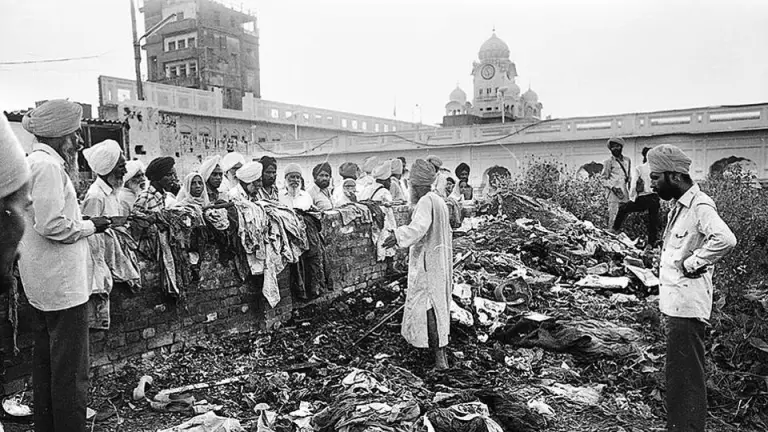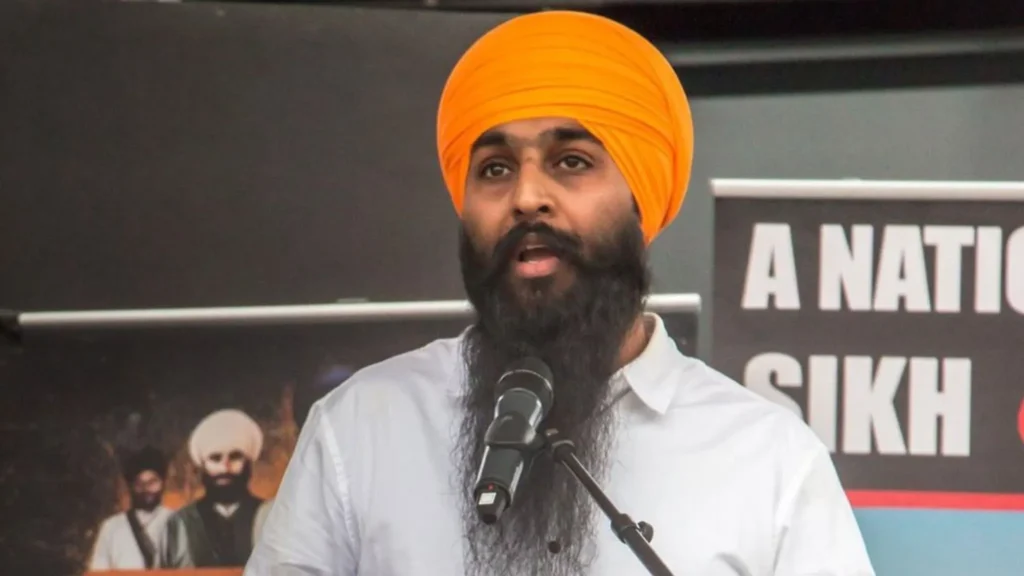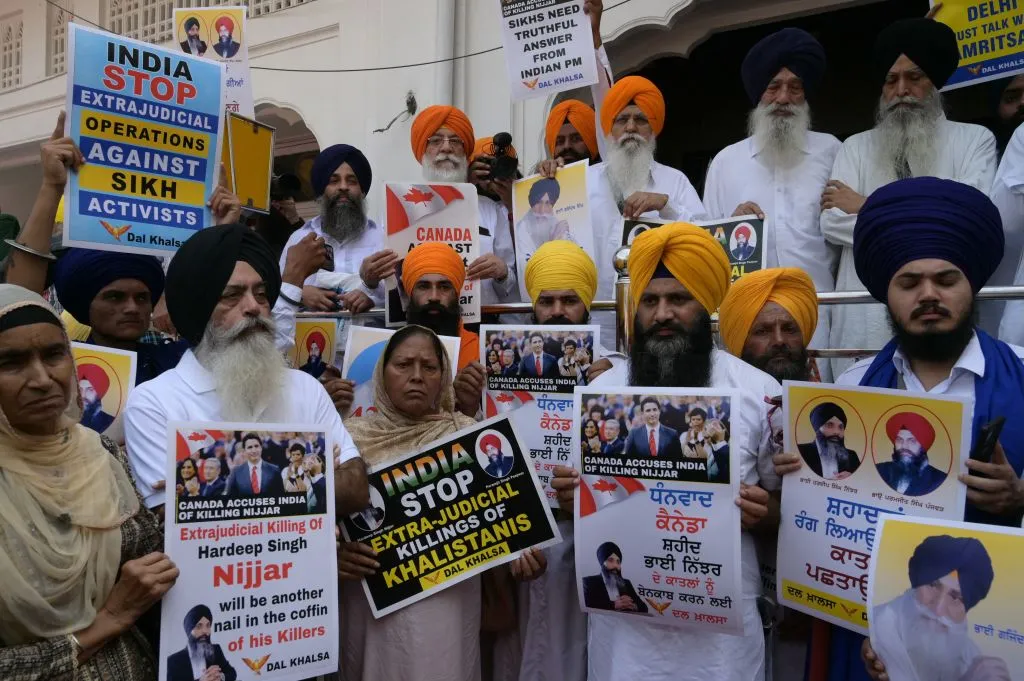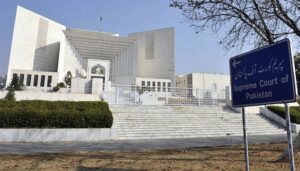For the Sikh minority, the pursuit of justice knows no bounds, rooted in the historical atrocities committed by the RSS-led Indian Government. Operation Blue Star in 1984 is, a dark chapter in Sikh history that, witnessed Prime Minister Indira Gandhi ordering the military to seize control of the holiest Sikh temple, the Golden Temple complex in Amritsar. Directed by Major General Kuldip Singh Brar, the operation resulted in the deaths of thousands of innocent Sikhs, with simultaneous attacks on forty other historical gurdwaras across East Punjab.
The aftermath of Operation Blue Star extended beyond the Temple Complex, triggering anti-Sikh riots across India in 1984 following the assassination of Prime Minister Indira Gandhi by her Sikh bodyguards. Over 3,000 Sikhs lost their lives in Delhi alone, with an estimated 8,000–20,000 Sikhs nationwide.
The RSS, a far-right Hindu nationalist group, played a negative role in shaping Indian Governments’ policy that aimed for suppressing the Sikh population through territorial separation, diminished political influence, and the systematic erosion of Sikh identity.

Lately, the Sikh diaspora’s unwavering pursuit of justice has gained global traction. A recent California State Assembly resolution has asked the US Congress to recognize the 1984 events as genocide. The resolution, submitted by Jameet Kaur Bains, highlights the Sikh community’s continued trauma and calls for justice against those responsible The global impact of Sikh resistance to the RSS-led Indian government’s misdeeds may be seen in incidents such as the mysterious disappearance of Sikh preacher Amritpal Singh and the assassination of Canadian Sikh leader Hardeep Singh Nijjar. These incidents, particularly the alleged poisoning of Khalistani advocate Avtar Singh Khanda in Birmingham, UK and murder attempt on Khalistan separatist Gurpatwant Singh Pannun in USA by Nikhil Gupta, who had close links with Indian intelligence tentacles, has sparked significant indignation and calls for justice.
India’s Foreign Minister, responded defensively to Canadian accusations of Indian involvement in Nijjar’s assassination. Notwithstanding its endorsement by Five Eye intelligence consortium and US president Biden’s statement, he instead asserted that the Indian Government does not endorse such actions and expressed a willingness to investigate specific information provided by Canada. The complexities of the situation were highlighted as Mr. Jaishankar emphasized the context of organized crime and secessionist forces, intertwining the issues of violence, extremism, and the Sikh struggle.

The international reaction to such events has been divided, with the UK under scrutiny for its political ties to the Indian Government.
The strange circumstances surrounding Avtar Singh Khanda’s mysterious death in Birmingham, which Trudeau declared as yet another victim of Indian Governmental aggression, distort the world view of the Sikh fight. The UK’s alleged cover-up and appeasement of the Indian Government underscores the difficulties faced by Sikh activists fighting for justice and the ability to voice their political beliefs.
The interconnection of these occurrences paints a grim picture of the challenges the Sikh community faces in pursuit of justice and recognition.
Farmer Bill protests in India have become a watershed moment in the ongoing struggle against the oppressive policies of the RSS-led Government.
Prominent Sikh activist Premi Singh discusses the Farmers Bills, emphasizing how the legislation deprives small farmers of their rights, pushing them into bankruptcy and allowing large corporations, many owned by far-right Hindu nationalists, to control agricultural markets. The RSS-led Government’s biased economic policies have disproportionately affected Sikh farmers, compounding the community’s problems. Economic decisions that favor large enterprises over small-scale farms aggravate economic disparities and jeopardize Sikh farmers’ livelihoods. The gaps extend to education and healthcare, where systemic biases impede access to high-quality institutions, endangering the well-being of Punjab residents, particularly Sikhs.
Internationally, the Sikh diaspora has been outspoken against the RSS-led Indian Government crackdown, raising awareness of the Sikh community’s situation. The UK’s silence on the issue has been attributed to political ties with the Indian Administration, emphasizing the importance of post-Brexit trade cooperation. Former Home Secretary of UK Priti Patel’s ties to far-right Hindu nationalists and her origins in Gujarat add to the intricate web of political influence determining the worldwide response to the Sikh cause. This MP can be seen in front lines of all events organized by Modi Sarkar, anywhere in the world.
However, beneath the surface of international awareness lies a web of draconian policies employed by the RSS-led Modi regime within India.
These policies, characterized by ruthless suppression and persecution, have cast a long and dark shadow on the Sikh minority. Reports of extrajudicial activities, disappearances, and torture highlight the severe human rights abuses faced by Sikhs in Indian Punjab. The political landscape in Punjab mirrors the complex relationship between the Sikh community and the Indian Government.

Demands for greater autonomy and decentralization of power persist, with unresolved issues related to political autonomy and resource allocation shaping the region’s trajectory. The historical wounds of Operation Blue Star and the 1984 anti-Sikh riots continue to fester, demanding acknowledgment, justice, and redress.
In light of the ongoing pursuit of justice by the Sikh community against the backdrop of historical and current atrocities, the statement by Pakistan’s Ministry of Foreign Affairs (MoFA) offers a compelling perspective on the global impact of Indian governmental actions, particularly those attributed to the Indian Research and Analysis Wing (R&AW).
According to MoFA Pakistan, in a recent operation undertaken by the Pakistani LEAs, the operational activities of R&AW agents within Pakistani borders, were busted. This network was engaged in extrajudicial and extra-territorial killings of Pakistani citizens through an intricate web handled by foreign financers. This assertion not only underscores the extent of India’s intelligence and covert operations but also aligns with the broader narrative of India’s alleged meddling in the internal affairs of neighboring countries, contributing to regional instability.
The involvement of RAW in Pakistan, as highlighted by MoFA Pakistan, serves to corroborate the patterns of behavior associated with the Indian Government’s approach to dissent and minority suppression, particularly against the Sikh community. Such actions, including the suspected involvement in the disappearance and assassination of Sikh leaders and activists beyond India’s borders, underline the global ramifications of India’s domestic policies and external engagements.
This international dimension of India’s strategies, aimed ostensibly at striking the dissent and curbing separatist movements, raises serious concerns about the violation of sovereign rights and international law.
It also emphasizes the need for a concerted international response to address these challenges and ensure accountability. The revelation of R&AW’s activities in Pakistan, as part of a broader strategy of extrajudicial interventions, not only exacerbates regional tensions but also illustrates the lengths to which the Indian Government might go to suppress opposition and maintain hegemony, impacting not just the Sikh diaspora but also the geopolitical dynamics of South Asia.
The very recent farmers’ march towards Delhi in February 2024, a significant movement predominantly led by the Sikh farming community from Punjab, further illuminates the Indian Government’s stance towards minority groups, especially Sikhs. The coercive treatment meted out to the protestors by the authorities has been a subject of international concern, with numerous reports of excessive force, water cannons, tear gas, and barricades used to deter the peaceful marchers. This harsh response not only highlights the Government’s intolerance towards dissent but also underscores the systemic bias and discrimination towards Sikhs in India.
Also Read: Indian Farmers Movement: ‘Chalo Delhi’ March
The farmers, protesting against agricultural reforms they fear would disproportionately harm their livelihoods, have been met with a level of state resistance that speaks volumes about the broader issues of minority rights and freedom of expression in the country. This scenario, where Sikh farmers at the forefront find themselves battling not just for their economic survival but also for their right to protest, reflects the ongoing challenges faced by the Sikh community in their quest for justice and equality under the Indian Government’s policies.
As the world grapples with the alarming growth of the Hindutva ideology, the Sikh community’s struggle, along with that of other minorities in India, serves as a painful reminder of the ongoing injustices that minority groups confront. The historical and ongoing violence against Sikhs demands global cooperation in identifying and resolving the systematic oppression that this resilient group faces. The echoes of Operation Blue Star and the 1984 anti-Sikh riots continue to ring out, underscoring the critical need for justice, accountability, and the preservation of the Sikh identity in the face of RSS-led atrocities that have now expanded beyond India’s borders.
The opinions shared in this article reflect the author’s personal views and do not necessarily align with the institution’s official stance.
Sehr Rushmeen, an Islamabad based freelance researcher, did her MPhil from National Defence University (NDU) in Strategic Studies, and her BSc from University of London (UOL) in International Relations. Her area of research interest is Strategic Nuclear Studies, Artificial Intelligence in Warfare, South China Sea and South Asian Politics. She tweets as @rushmeentweets and can be reached on sehrrushmeenwrites@gmail.com.




